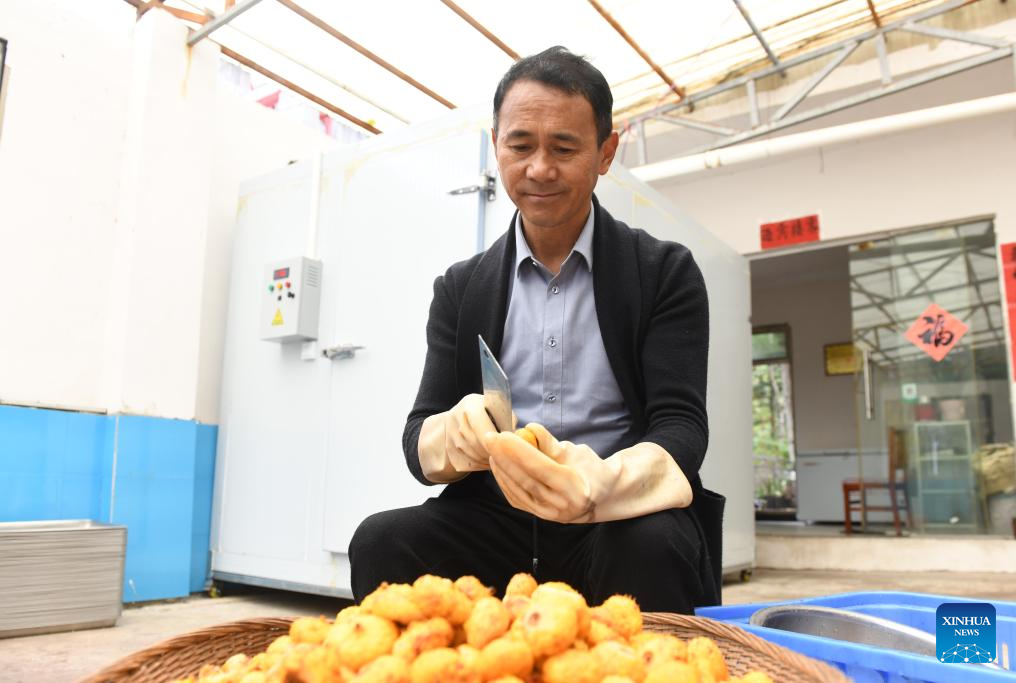
A worker slices Cili fruits in Chaxiang Village of Longli County, southwest China's Guizhou Province, Nov. 8, 2023.
Cili (Rosa roxburghii), meaning "thorn pear" in Chinese, is a yellowish, spiny fruit renowned for its rich vitamin C content and various nutritional benefits. This distinctive fruit is a hallmark produce of the mountainous regions in southwest China's Guizhou. Currently, the Cili production stands as a key driver in promoting rural revitalization in Longli County, Guizhou Province. The county's Cili cultivation area has expanded to 105,000 mu (7,000 hectares), yielding an annual output of 16,000 tons of fresh fruit. The comprehensive output value exceeds 400 million yuan (approximately 54.87 million U.S. dollars), significantly contributing to the income growth of the over 8,000 local farmers.
Meanwhile in the semi-arid parts of Mexico, another kind of throny fruit also brings profits to local farmers. The prickly pear cactus is a plant that bears fruit featuring thorns all over and a juicy texture with refreshing taste. Thriving in the arid highlands of Mexico, this cactus requires minimal water and pesticides for cultivation. The planting of these fruits not only contributes to local ecological management but also serves as a source of increased income for the community. (Photo by Wang Lixin/Xinhua)
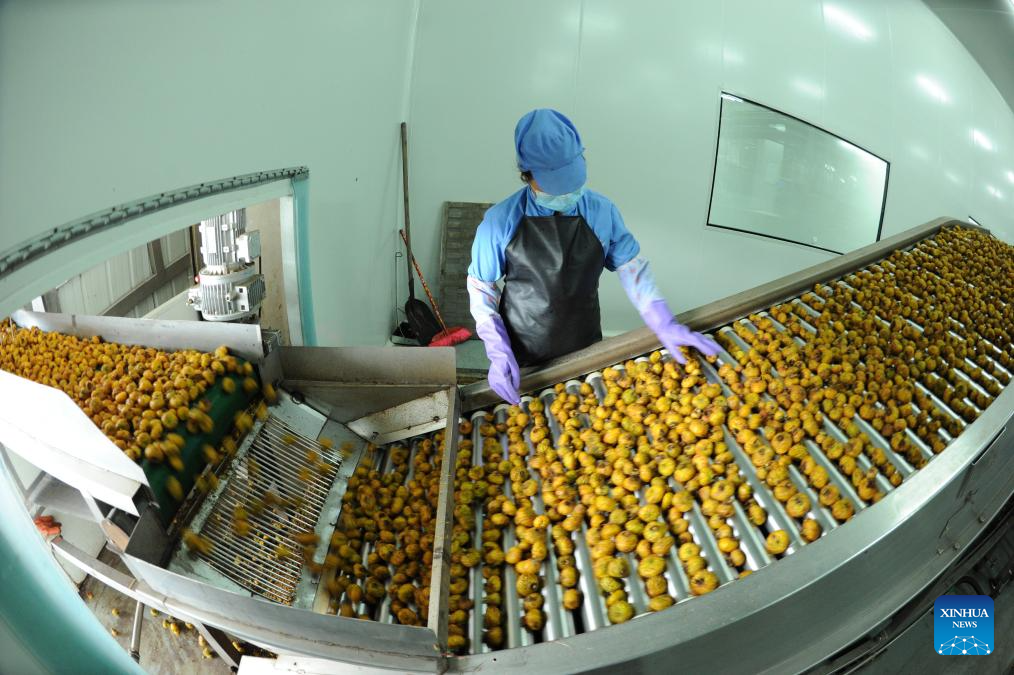
A worker selects Cili fruit at a Cili processing company in Longli County, southwest China's Guizhou Province, Aug. 23, 2018.
Cili (Rosa roxburghii), meaning "thorn pear" in Chinese, is a yellowish, spiny fruit renowned for its rich vitamin C content and various nutritional benefits. This distinctive fruit is a hallmark produce of the mountainous regions in southwest China's Guizhou. Currently, the Cili production stands as a key driver in promoting rural revitalization in Longli County, Guizhou Province. The county's Cili cultivation area has expanded to 105,000 mu (7,000 hectares), yielding an annual output of 16,000 tons of fresh fruit. The comprehensive output value exceeds 400 million yuan (approximately 54.87 million U.S. dollars), significantly contributing to the income growth of the over 8,000 local farmers.
Meanwhile in the semi-arid parts of Mexico, another kind of throny fruit also brings profits to local farmers. The prickly pear cactus is a plant that bears fruit featuring thorns all over and a juicy texture with refreshing taste. Thriving in the arid highlands of Mexico, this cactus requires minimal water and pesticides for cultivation. The planting of these fruits not only contributes to local ecological management but also serves as a source of increased income for the community. (Xinhua/Yang Wenbin)
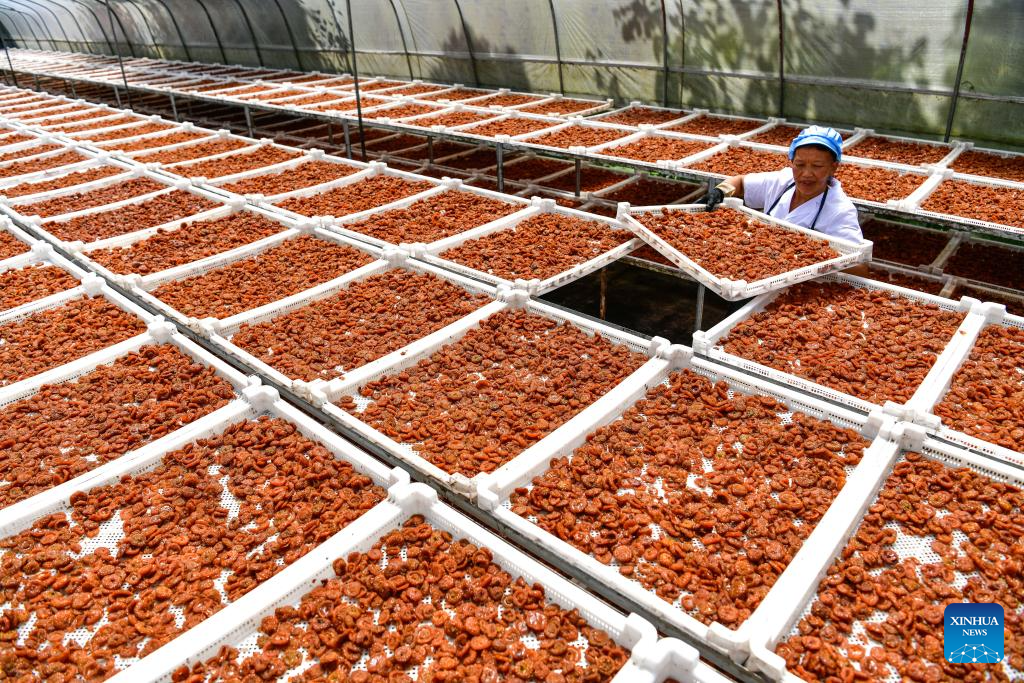
A farmer dries preserved Cili fruits in Gujiao Town of Longli County, southwest China's Guizhou Province, Sept. 1, 2023.
Cili (Rosa roxburghii), meaning "thorn pear" in Chinese, is a yellowish, spiny fruit renowned for its rich vitamin C content and various nutritional benefits. This distinctive fruit is a hallmark produce of the mountainous regions in southwest China's Guizhou. Currently, the Cili production stands as a key driver in promoting rural revitalization in Longli County, Guizhou Province. The county's Cili cultivation area has expanded to 105,000 mu (7,000 hectares), yielding an annual output of 16,000 tons of fresh fruit. The comprehensive output value exceeds 400 million yuan (approximately 54.87 million U.S. dollars), significantly contributing to the income growth of the over 8,000 local farmers.
Meanwhile in the semi-arid parts of Mexico, another kind of throny fruit also brings profits to local farmers. The prickly pear cactus is a plant that bears fruit featuring thorns all over and a juicy texture with refreshing taste. Thriving in the arid highlands of Mexico, this cactus requires minimal water and pesticides for cultivation. The planting of these fruits not only contributes to local ecological management but also serves as a source of increased income for the community. (Xinhua/Yang Wenbin)
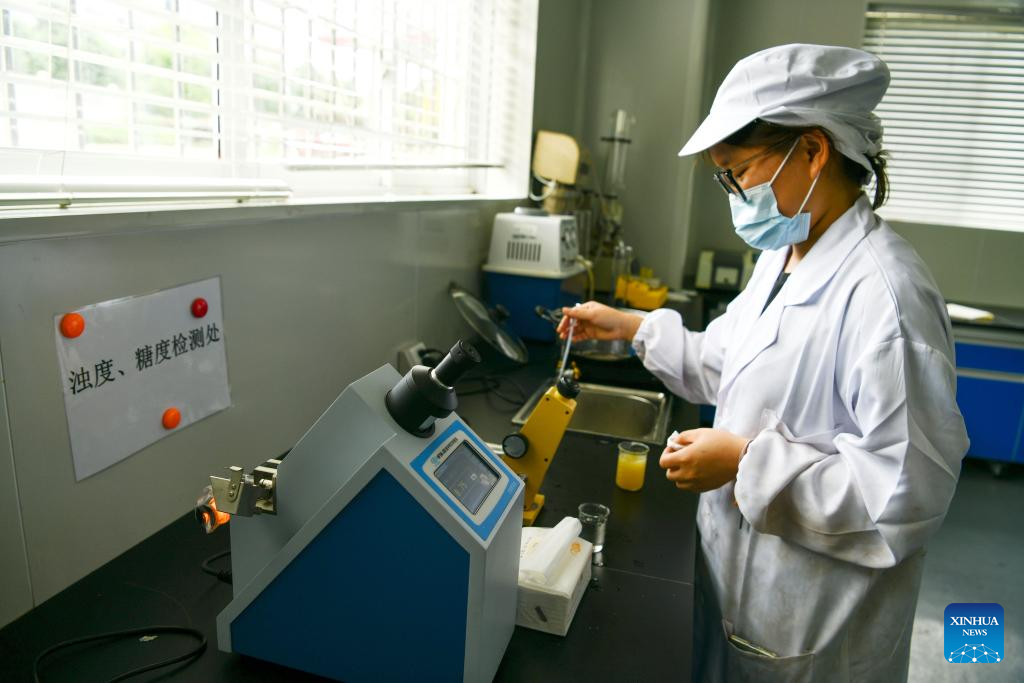
A worker checks the turbidity and sugar content of Cili at a Cili processing company in Longli County, southwest China's Guizhou Province, Aug. 19, 2021.
Cili (Rosa roxburghii), meaning "thorn pear" in Chinese, is a yellowish, spiny fruit renowned for its rich vitamin C content and various nutritional benefits. This distinctive fruit is a hallmark produce of the mountainous regions in southwest China's Guizhou. Currently, the Cili production stands as a key driver in promoting rural revitalization in Longli County, Guizhou Province. The county's Cili cultivation area has expanded to 105,000 mu (7,000 hectares), yielding an annual output of 16,000 tons of fresh fruit. The comprehensive output value exceeds 400 million yuan (approximately 54.87 million U.S. dollars), significantly contributing to the income growth of the over 8,000 local farmers.
Meanwhile in the semi-arid parts of Mexico, another kind of throny fruit also brings profits to local farmers. The prickly pear cactus is a plant that bears fruit featuring thorns all over and a juicy texture with refreshing taste. Thriving in the arid highlands of Mexico, this cactus requires minimal water and pesticides for cultivation. The planting of these fruits not only contributes to local ecological management but also serves as a source of increased income for the community. (Xinhua/Yang Wenbin)
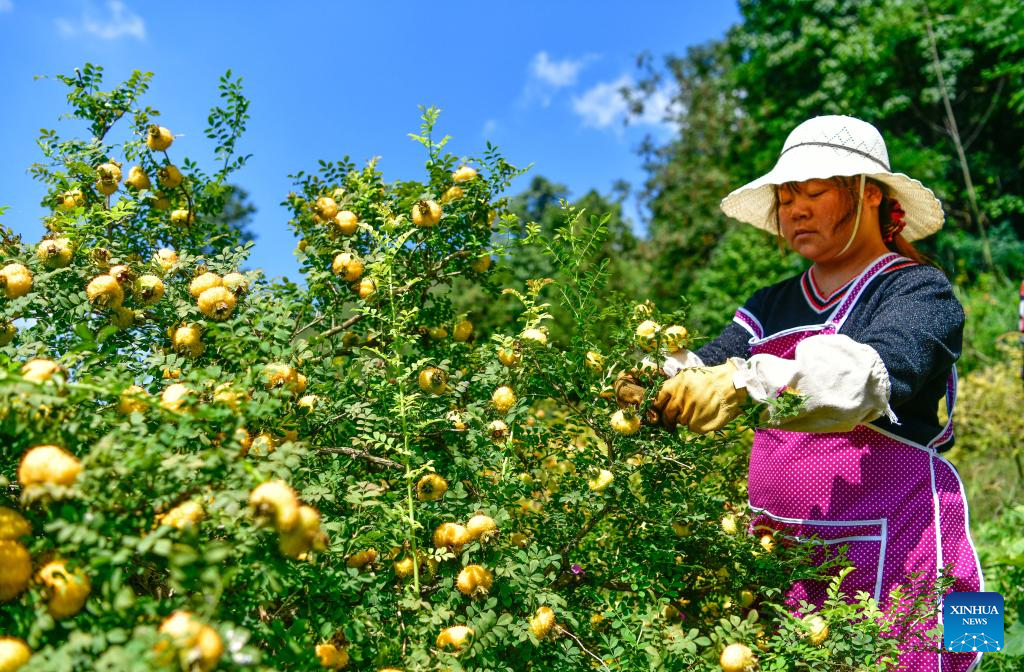
A farmer collects Cili fruits in Chaxiang Village of Longli County, southwest China's Guizhou Province, Sept. 1, 2023.
Cili (Rosa roxburghii), meaning "thorn pear" in Chinese, is a yellowish, spiny fruit renowned for its rich vitamin C content and various nutritional benefits. This distinctive fruit is a hallmark produce of the mountainous regions in southwest China's Guizhou. Currently, the Cili production stands as a key driver in promoting rural revitalization in Longli County, Guizhou Province. The county's Cili cultivation area has expanded to 105,000 mu (7,000 hectares), yielding an annual output of 16,000 tons of fresh fruit. The comprehensive output value exceeds 400 million yuan (approximately 54.87 million U.S. dollars), significantly contributing to the income growth of the over 8,000 local farmers.
Meanwhile in the semi-arid parts of Mexico, another kind of throny fruit also brings profits to local farmers. The prickly pear cactus is a plant that bears fruit featuring thorns all over and a juicy texture with refreshing taste. Thriving in the arid highlands of Mexico, this cactus requires minimal water and pesticides for cultivation. The planting of these fruits not only contributes to local ecological management but also serves as a source of increased income for the community. (Xinhua/Yang Wenbin)
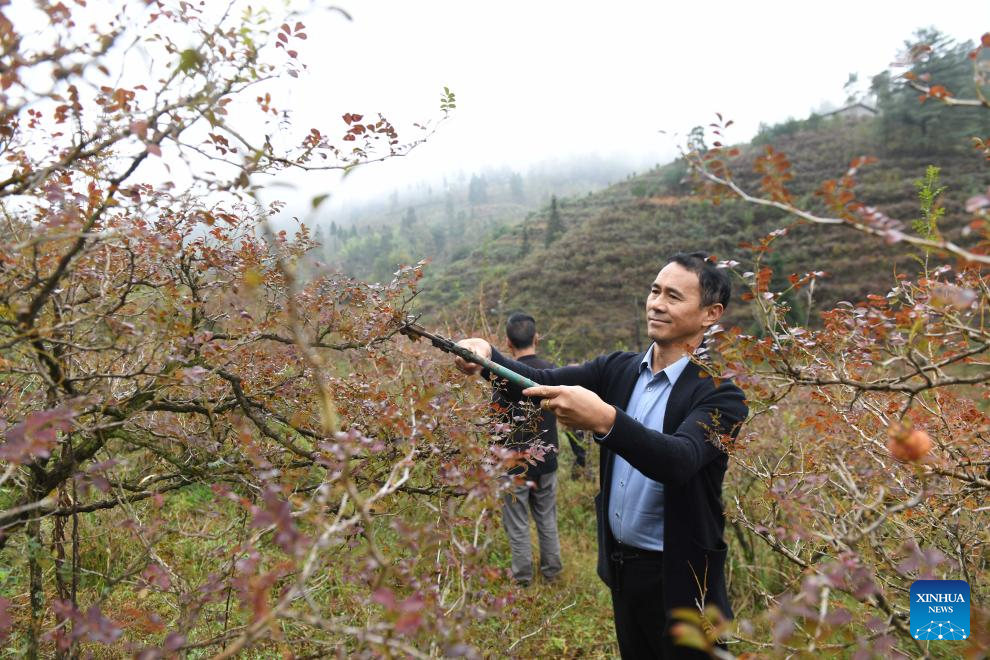
A worker trims a Cili tree in Chaxiang Village of Longli County, southwest China's Guizhou Province, Nov. 8, 2023.
Cili (Rosa roxburghii), meaning "thorn pear" in Chinese, is a yellowish, spiny fruit renowned for its rich vitamin C content and various nutritional benefits. This distinctive fruit is a hallmark produce of the mountainous regions in southwest China's Guizhou. Currently, the Cili production stands as a key driver in promoting rural revitalization in Longli County, Guizhou Province. The county's Cili cultivation area has expanded to 105,000 mu (7,000 hectares), yielding an annual output of 16,000 tons of fresh fruit. The comprehensive output value exceeds 400 million yuan (approximately 54.87 million U.S. dollars), significantly contributing to the income growth of the over 8,000 local farmers.
Meanwhile in the semi-arid parts of Mexico, another kind of throny fruit also brings profits to local farmers. The prickly pear cactus is a plant that bears fruit featuring thorns all over and a juicy texture with refreshing taste. Thriving in the arid highlands of Mexico, this cactus requires minimal water and pesticides for cultivation. The planting of these fruits not only contributes to local ecological management but also serves as a source of increased income for the community. (Photo by Wang Lixin/Xinhua)
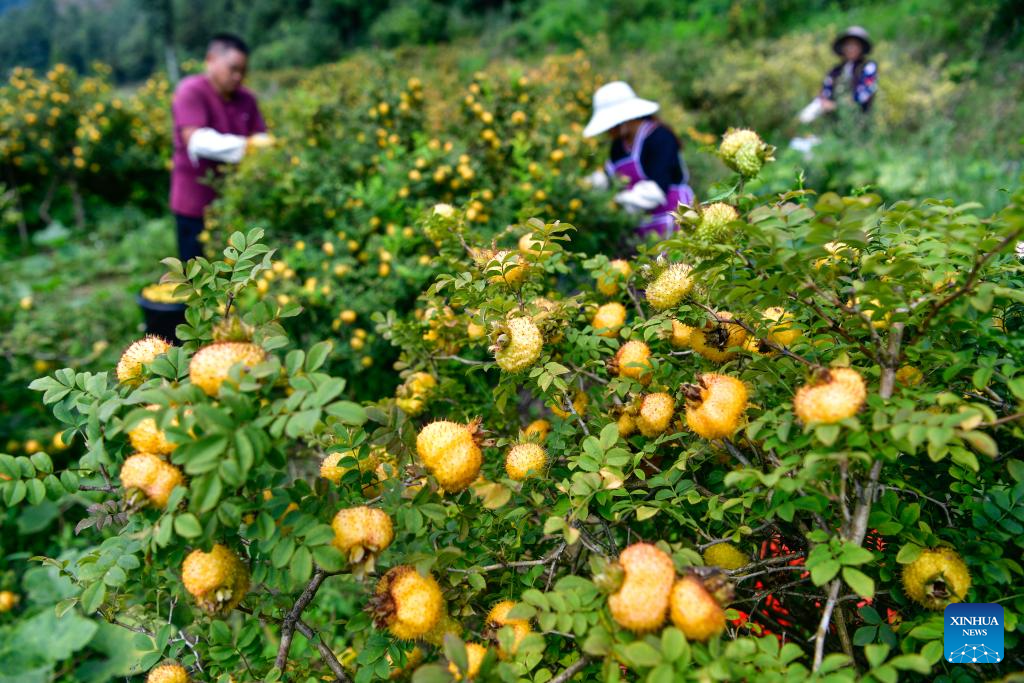
Farmers collect Cili fruits in Chaxiang Village of Longli County, southwest China's Guizhou Province, Sept. 1, 2023.
Cili (Rosa roxburghii), meaning "thorn pear" in Chinese, is a yellowish, spiny fruit renowned for its rich vitamin C content and various nutritional benefits. This distinctive fruit is a hallmark produce of the mountainous regions in southwest China's Guizhou. Currently, the Cili production stands as a key driver in promoting rural revitalization in Longli County, Guizhou Province. The county's Cili cultivation area has expanded to 105,000 mu (7,000 hectares), yielding an annual output of 16,000 tons of fresh fruit. The comprehensive output value exceeds 400 million yuan (approximately 54.87 million U.S. dollars), significantly contributing to the income growth of the over 8,000 local farmers.
Meanwhile in the semi-arid parts of Mexico, another kind of throny fruit also brings profits to local farmers. The prickly pear cactus is a plant that bears fruit featuring thorns all over and a juicy texture with refreshing taste. Thriving in the arid highlands of Mexico, this cactus requires minimal water and pesticides for cultivation. The planting of these fruits not only contributes to local ecological management but also serves as a source of increased income for the community. (Xinhua/Yang Wenbin)
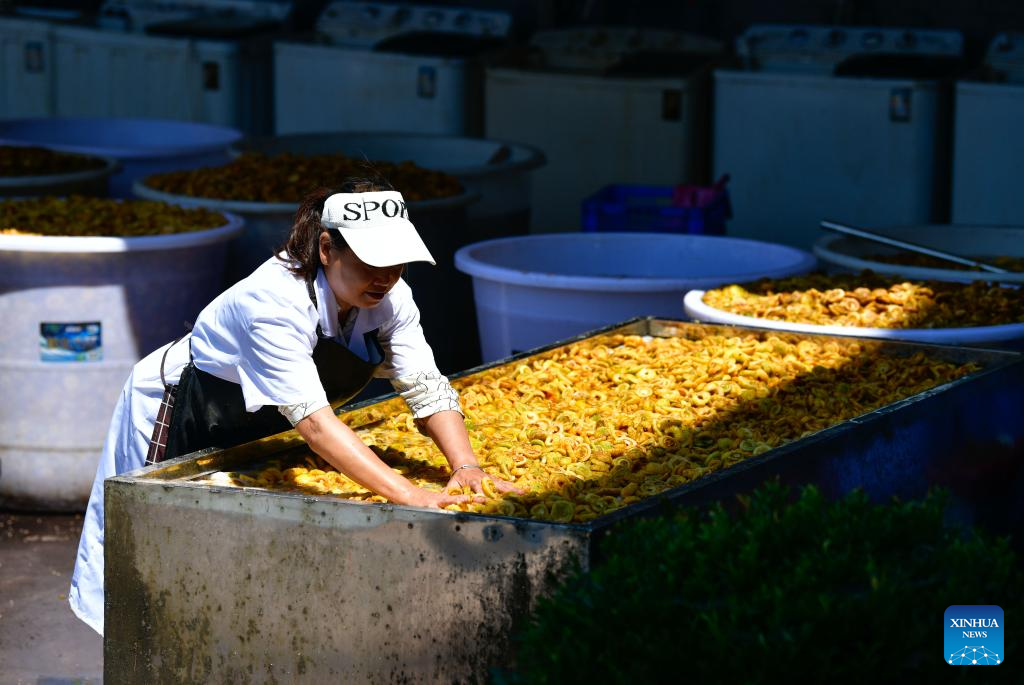
A worker washes Cili fruit slices in Gujiao Town of Longli County, southwest China's Guizhou Province, Sept. 1, 2023.
Cili (Rosa roxburghii), meaning "thorn pear" in Chinese, is a yellowish, spiny fruit renowned for its rich vitamin C content and various nutritional benefits. This distinctive fruit is a hallmark produce of the mountainous regions in southwest China's Guizhou. Currently, the Cili production stands as a key driver in promoting rural revitalization in Longli County, Guizhou Province. The county's Cili cultivation area has expanded to 105,000 mu (7,000 hectares), yielding an annual output of 16,000 tons of fresh fruit. The comprehensive output value exceeds 400 million yuan (approximately 54.87 million U.S. dollars), significantly contributing to the income growth of the over 8,000 local farmers.
Meanwhile in the semi-arid parts of Mexico, another kind of throny fruit also brings profits to local farmers. The prickly pear cactus is a plant that bears fruit featuring thorns all over and a juicy texture with refreshing taste. Thriving in the arid highlands of Mexico, this cactus requires minimal water and pesticides for cultivation. The planting of these fruits not only contributes to local ecological management but also serves as a source of increased income for the community. (Xinhua/Yang Wenbin)
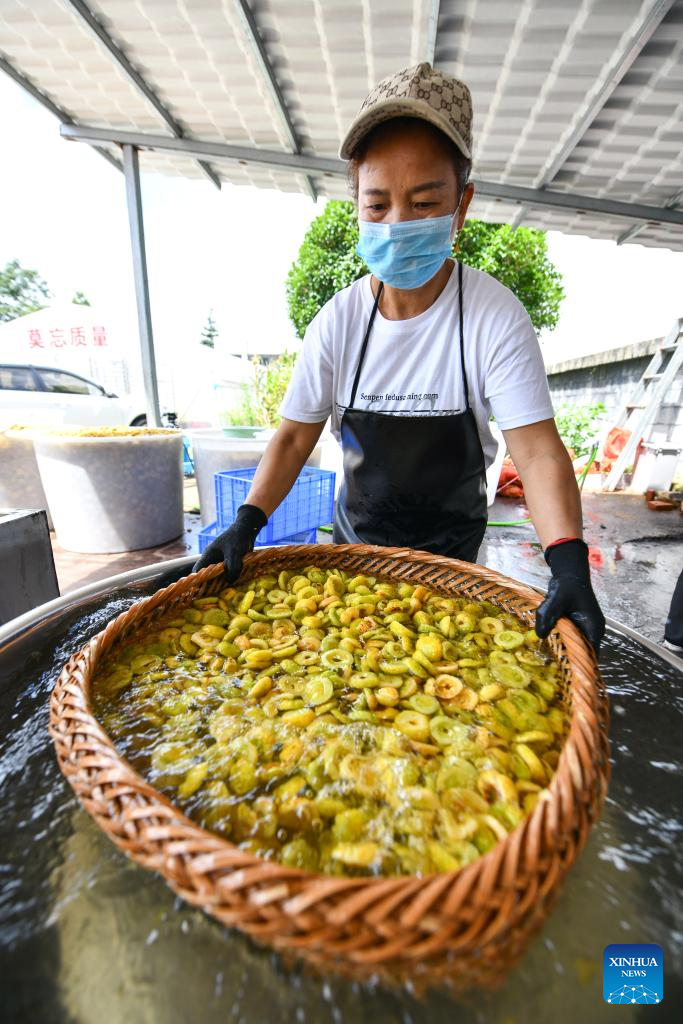
A farmer washes Cili fruits at a cooperative in Gujiao Town of Longli County, southwest China's Guizhou Province, Aug. 18, 2021.
Cili (Rosa roxburghii), meaning "thorn pear" in Chinese, is a yellowish, spiny fruit renowned for its rich vitamin C content and various nutritional benefits. This distinctive fruit is a hallmark produce of the mountainous regions in southwest China's Guizhou. Currently, the Cili production stands as a key driver in promoting rural revitalization in Longli County, Guizhou Province. The county's Cili cultivation area has expanded to 105,000 mu (7,000 hectares), yielding an annual output of 16,000 tons of fresh fruit. The comprehensive output value exceeds 400 million yuan (approximately 54.87 million U.S. dollars), significantly contributing to the income growth of the over 8,000 local farmers.
Meanwhile in the semi-arid parts of Mexico, another kind of throny fruit also brings profits to local farmers. The prickly pear cactus is a plant that bears fruit featuring thorns all over and a juicy texture with refreshing taste. Thriving in the arid highlands of Mexico, this cactus requires minimal water and pesticides for cultivation. The planting of these fruits not only contributes to local ecological management but also serves as a source of increased income for the community. (Xinhua/Yang Wenbin)
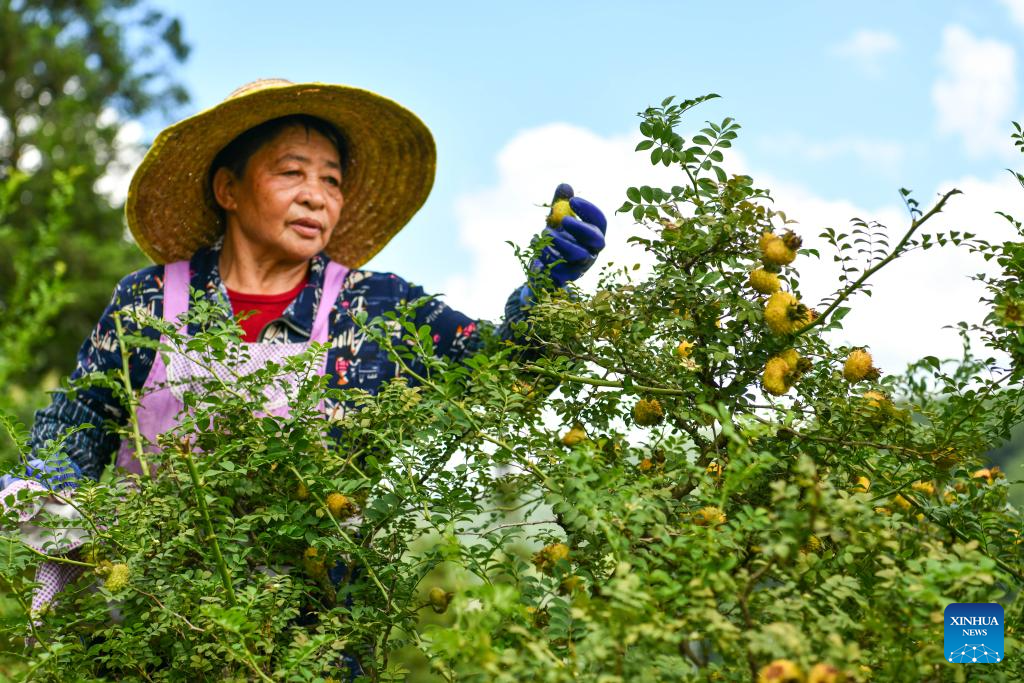
A farmer collects Cili fruits in Gujiao Town of Longli County, southwest China's Guizhou Province, Aug. 18, 2021.
Cili (Rosa roxburghii), meaning "thorn pear" in Chinese, is a yellowish, spiny fruit renowned for its rich vitamin C content and various nutritional benefits. This distinctive fruit is a hallmark produce of the mountainous regions in southwest China's Guizhou. Currently, the Cili production stands as a key driver in promoting rural revitalization in Longli County, Guizhou Province. The county's Cili cultivation area has expanded to 105,000 mu (7,000 hectares), yielding an annual output of 16,000 tons of fresh fruit. The comprehensive output value exceeds 400 million yuan (approximately 54.87 million U.S. dollars), significantly contributing to the income growth of the over 8,000 local farmers.
Meanwhile in the semi-arid parts of Mexico, another kind of throny fruit also brings profits to local farmers. The prickly pear cactus is a plant that bears fruit featuring thorns all over and a juicy texture with refreshing taste. Thriving in the arid highlands of Mexico, this cactus requires minimal water and pesticides for cultivation. The planting of these fruits not only contributes to local ecological management but also serves as a source of increased income for the community. (Xinhua/Yang Wenbin)
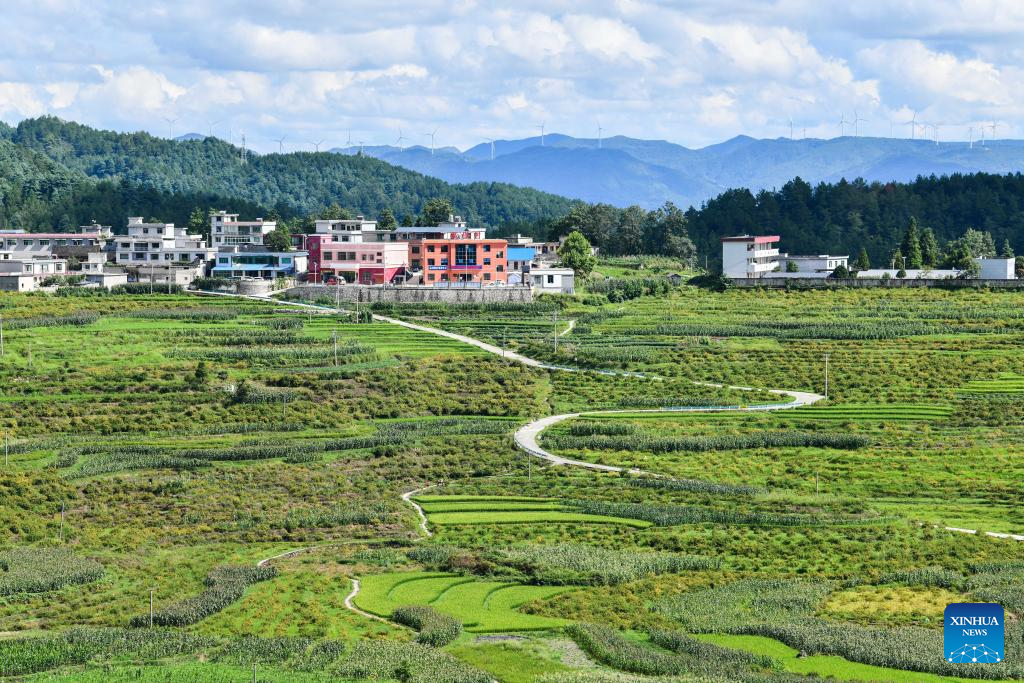
This photo taken on Aug. 18, 2021 shows a Cili planting area in Gujiao Town of Longli County, southwest China's Guizhou Province.
Cili (Rosa roxburghii), meaning "thorn pear" in Chinese, is a yellowish, spiny fruit renowned for its rich vitamin C content and various nutritional benefits. This distinctive fruit is a hallmark produce of the mountainous regions in southwest China's Guizhou. Currently, the Cili production stands as a key driver in promoting rural revitalization in Longli County, Guizhou Province. The county's Cili cultivation area has expanded to 105,000 mu (7,000 hectares), yielding an annual output of 16,000 tons of fresh fruit. The comprehensive output value exceeds 400 million yuan (approximately 54.87 million U.S. dollars), significantly contributing to the income growth of the over 8,000 local farmers.
Meanwhile in the semi-arid parts of Mexico, another kind of throny fruit also brings profits to local farmers. The prickly pear cactus is a plant that bears fruit featuring thorns all over and a juicy texture with refreshing taste. Thriving in the arid highlands of Mexico, this cactus requires minimal water and pesticides for cultivation. The planting of these fruits not only contributes to local ecological management but also serves as a source of increased income for the community. (Xinhua/Yang Wenbin)
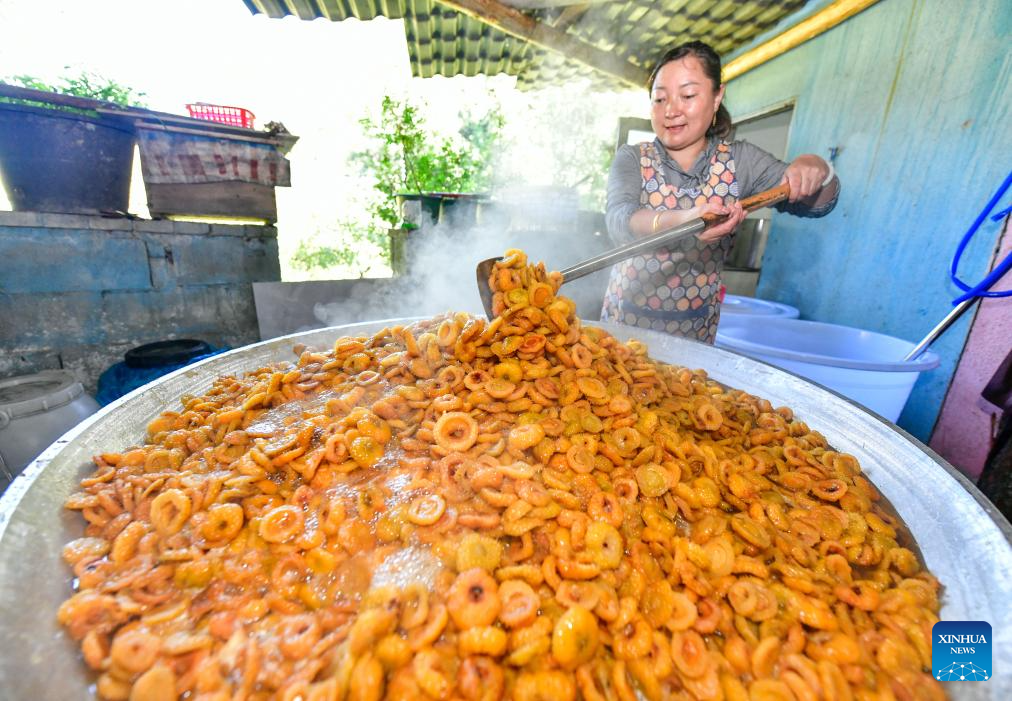
A worker makes preserved Cili fruit at a cooperative in Chaxiang Village of Longli County, southwest China's Guizhou Province, Sept. 1, 2023.
Cili (Rosa roxburghii), meaning "thorn pear" in Chinese, is a yellowish, spiny fruit renowned for its rich vitamin C content and various nutritional benefits. This distinctive fruit is a hallmark produce of the mountainous regions in southwest China's Guizhou. Currently, the Cili production stands as a key driver in promoting rural revitalization in Longli County, Guizhou Province. The county's Cili cultivation area has expanded to 105,000 mu (7,000 hectares), yielding an annual output of 16,000 tons of fresh fruit. The comprehensive output value exceeds 400 million yuan (approximately 54.87 million U.S. dollars), significantly contributing to the income growth of the over 8,000 local farmers.
Meanwhile in the semi-arid parts of Mexico, another kind of throny fruit also brings profits to local farmers. The prickly pear cactus is a plant that bears fruit featuring thorns all over and a juicy texture with refreshing taste. Thriving in the arid highlands of Mexico, this cactus requires minimal water and pesticides for cultivation. The planting of these fruits not only contributes to local ecological management but also serves as a source of increased income for the community. (Xinhua/Yang Wenbin)
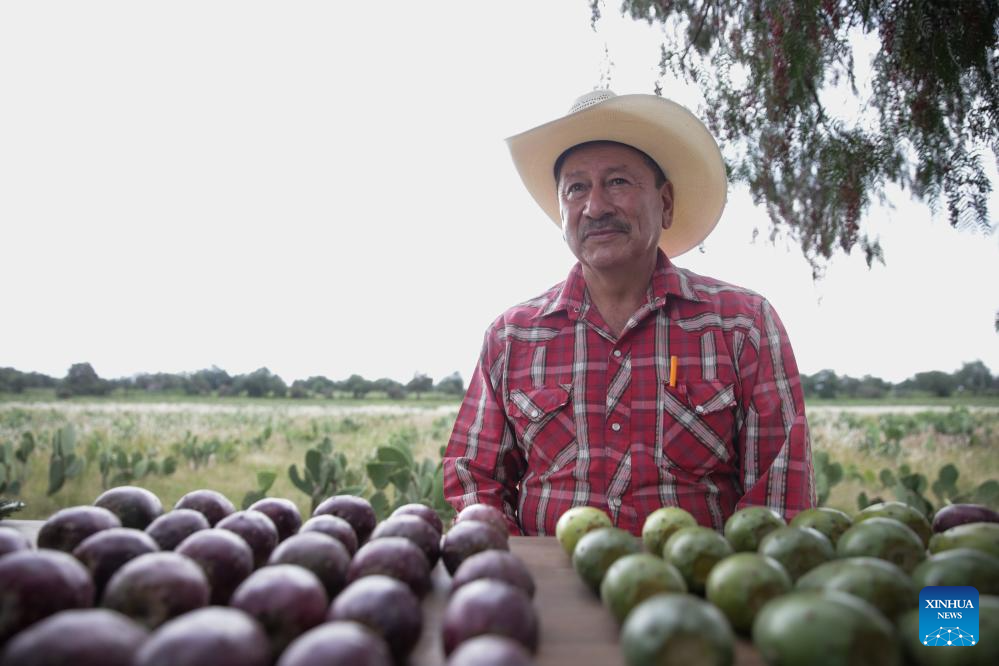
An agricultural expert shows prickly pears in different colors in Teotihuacan, Mexico, Aug. 3, 2023.
Cili (Rosa roxburghii), meaning "thorn pear" in Chinese, is a yellowish, spiny fruit renowned for its rich vitamin C content and various nutritional benefits. This distinctive fruit is a hallmark produce of the mountainous regions in southwest China's Guizhou. Currently, the Cili production stands as a key driver in promoting rural revitalization in Longli County, Guizhou Province. The county's Cili cultivation area has expanded to 105,000 mu (7,000 hectares), yielding an annual output of 16,000 tons of fresh fruit. The comprehensive output value exceeds 400 million yuan (approximately 54.87 million U.S. dollars), significantly contributing to the income growth of the over 8,000 local farmers.
Meanwhile in the semi-arid parts of Mexico, another kind of throny fruit also brings profits to local farmers. The prickly pear cactus is a plant that bears fruit featuring thorns all over and a juicy texture with refreshing taste. Thriving in the arid highlands of Mexico, this cactus requires minimal water and pesticides for cultivation. The planting of these fruits not only contributes to local ecological management but also serves as a source of increased income for the community. (Photo by Francisco Canedo/Xinhua)
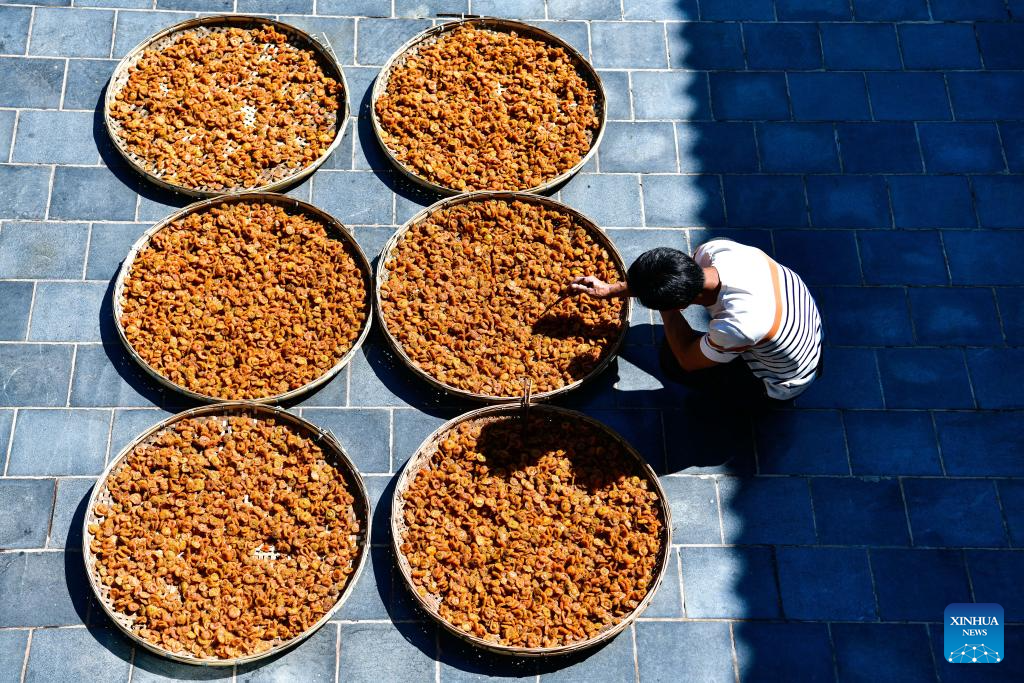
A farmer dries preserved Cili fruits at a cooperative in Chaxiang Village of Longli County, southwest China's Guizhou Province, Sept. 1, 2023.
Cili (Rosa roxburghii), meaning "thorn pear" in Chinese, is a yellowish, spiny fruit renowned for its rich vitamin C content and various nutritional benefits. This distinctive fruit is a hallmark produce of the mountainous regions in southwest China's Guizhou. Currently, the Cili production stands as a key driver in promoting rural revitalization in Longli County, Guizhou Province. The county's Cili cultivation area has expanded to 105,000 mu (7,000 hectares), yielding an annual output of 16,000 tons of fresh fruit. The comprehensive output value exceeds 400 million yuan (approximately 54.87 million U.S. dollars), significantly contributing to the income growth of the over 8,000 local farmers.
Meanwhile in the semi-arid parts of Mexico, another kind of throny fruit also brings profits to local farmers. The prickly pear cactus is a plant that bears fruit featuring thorns all over and a juicy texture with refreshing taste. Thriving in the arid highlands of Mexico, this cactus requires minimal water and pesticides for cultivation. The planting of these fruits not only contributes to local ecological management but also serves as a source of increased income for the community. (Xinhua/Yang Wenbin)
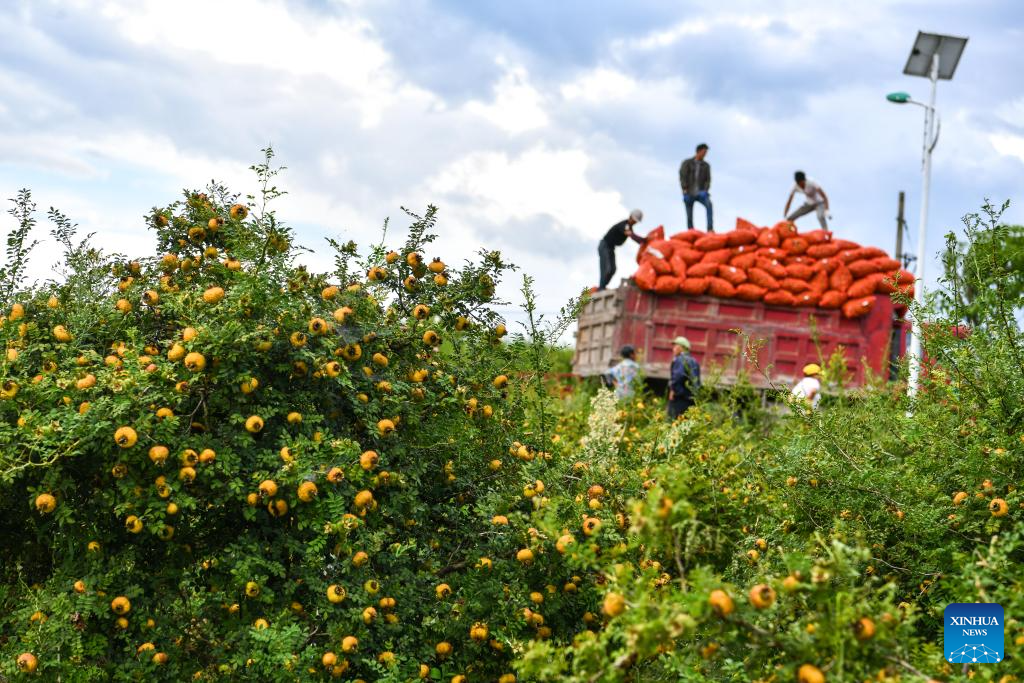
This photo taken on Aug. 18, 2021 shows farmers load newly collected Cili fruits onto a truck in Taishang Village of Longli County, southwest China's Guizhou Province.
Cili (Rosa roxburghii), meaning "thorn pear" in Chinese, is a yellowish, spiny fruit renowned for its rich vitamin C content and various nutritional benefits. This distinctive fruit is a hallmark produce of the mountainous regions in southwest China's Guizhou. Currently, the Cili production stands as a key driver in promoting rural revitalization in Longli County, Guizhou Province. The county's Cili cultivation area has expanded to 105,000 mu (7,000 hectares), yielding an annual output of 16,000 tons of fresh fruit. The comprehensive output value exceeds 400 million yuan (approximately 54.87 million U.S. dollars), significantly contributing to the income growth of the over 8,000 local farmers.
Meanwhile in the semi-arid parts of Mexico, another kind of throny fruit also brings profits to local farmers. The prickly pear cactus is a plant that bears fruit featuring thorns all over and a juicy texture with refreshing taste. Thriving in the arid highlands of Mexico, this cactus requires minimal water and pesticides for cultivation. The planting of these fruits not only contributes to local ecological management but also serves as a source of increased income for the community. (Xinhua/Yang Wenbin)

This aerial photo taken on Aug. 18, 2021 shows workers loading Cili fruits onto a truck in Taishang Village of Longli County, southwest China's Guizhou Province.
Cili (Rosa roxburghii), meaning "thorn pear" in Chinese, is a yellowish, spiny fruit renowned for its rich vitamin C content and various nutritional benefits. This distinctive fruit is a hallmark produce of the mountainous regions in southwest China's Guizhou. Currently, the Cili production stands as a key driver in promoting rural revitalization in Longli County, Guizhou Province. The county's Cili cultivation area has expanded to 105,000 mu (7,000 hectares), yielding an annual output of 16,000 tons of fresh fruit. The comprehensive output value exceeds 400 million yuan (approximately 54.87 million U.S. dollars), significantly contributing to the income growth of the over 8,000 local farmers.
Meanwhile in the semi-arid parts of Mexico, another kind of throny fruit also brings profits to local farmers. The prickly pear cactus is a plant that bears fruit featuring thorns all over and a juicy texture with refreshing taste. Thriving in the arid highlands of Mexico, this cactus requires minimal water and pesticides for cultivation. The planting of these fruits not only contributes to local ecological management but also serves as a source of increased income for the community. (Xinhua/Yang Wenbin)
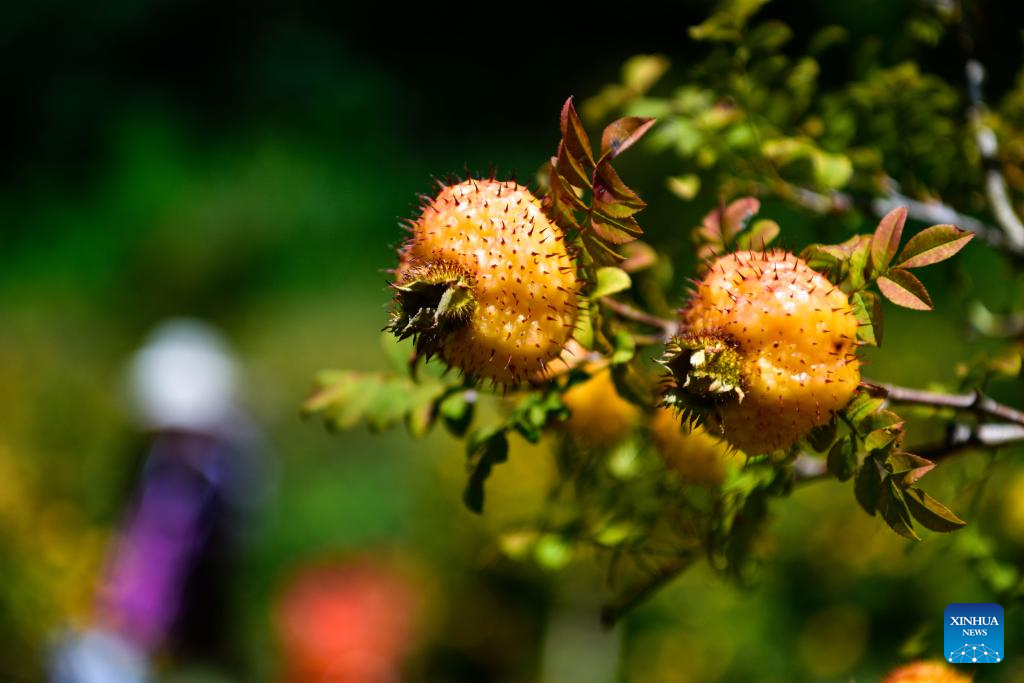
Cili fruits are pictured in Chaxiang Village of Longli County, southwest China's Guizhou Province, Sept. 1, 2023.
Cili (Rosa roxburghii), meaning "thorn pear" in Chinese, is a yellowish, spiny fruit renowned for its rich vitamin C content and various nutritional benefits. This distinctive fruit is a hallmark produce of the mountainous regions in southwest China's Guizhou. Currently, the Cili production stands as a key driver in promoting rural revitalization in Longli County, Guizhou Province. The county's Cili cultivation area has expanded to 105,000 mu (7,000 hectares), yielding an annual output of 16,000 tons of fresh fruit. The comprehensive output value exceeds 400 million yuan (approximately 54.87 million U.S. dollars), significantly contributing to the income growth of the over 8,000 local farmers.
Meanwhile in the semi-arid parts of Mexico, another kind of throny fruit also brings profits to local farmers. The prickly pear cactus is a plant that bears fruit featuring thorns all over and a juicy texture with refreshing taste. Thriving in the arid highlands of Mexico, this cactus requires minimal water and pesticides for cultivation. The planting of these fruits not only contributes to local ecological management but also serves as a source of increased income for the community. (Xinhua/Yang Wenbin)
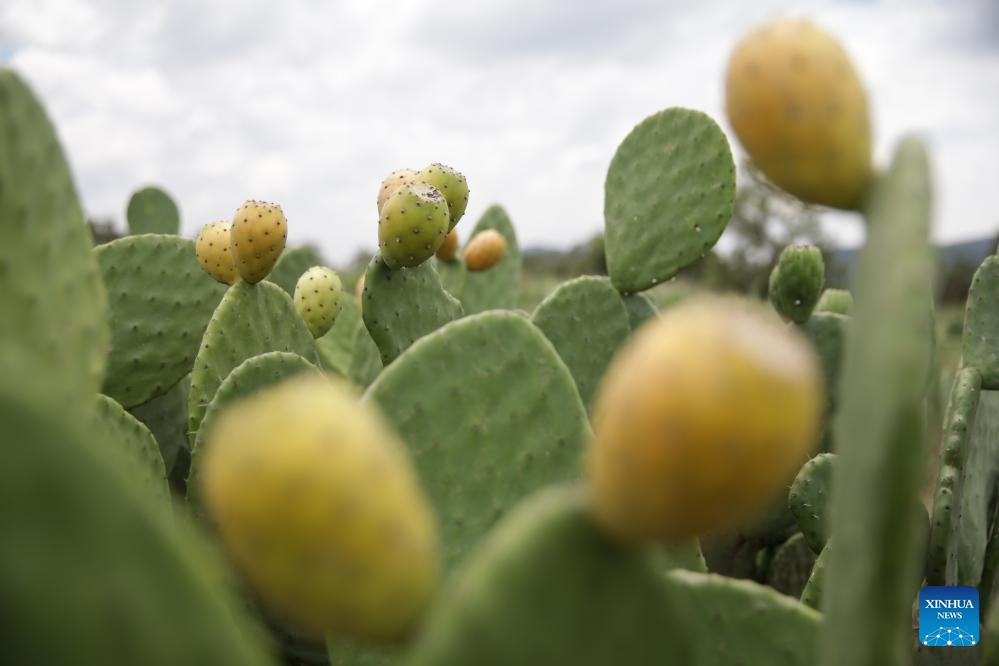
Prickly pear cacti are pictured in Teotihuacan, Mexico, Aug. 3, 2023.
Cili (Rosa roxburghii), meaning "thorn pear" in Chinese, is a yellowish, spiny fruit renowned for its rich vitamin C content and various nutritional benefits. This distinctive fruit is a hallmark produce of the mountainous regions in southwest China's Guizhou. Currently, the Cili production stands as a key driver in promoting rural revitalization in Longli County, Guizhou Province. The county's Cili cultivation area has expanded to 105,000 mu (7,000 hectares), yielding an annual output of 16,000 tons of fresh fruit. The comprehensive output value exceeds 400 million yuan (approximately 54.87 million U.S. dollars), significantly contributing to the income growth of the over 8,000 local farmers.
Meanwhile in the semi-arid parts of Mexico, another kind of throny fruit also brings profits to local farmers. The prickly pear cactus is a plant that bears fruit featuring thorns all over and a juicy texture with refreshing taste. Thriving in the arid highlands of Mexico, this cactus requires minimal water and pesticides for cultivation. The planting of these fruits not only contributes to local ecological management but also serves as a source of increased income for the community. (Photo by Francisco Canedo/Xinhua)
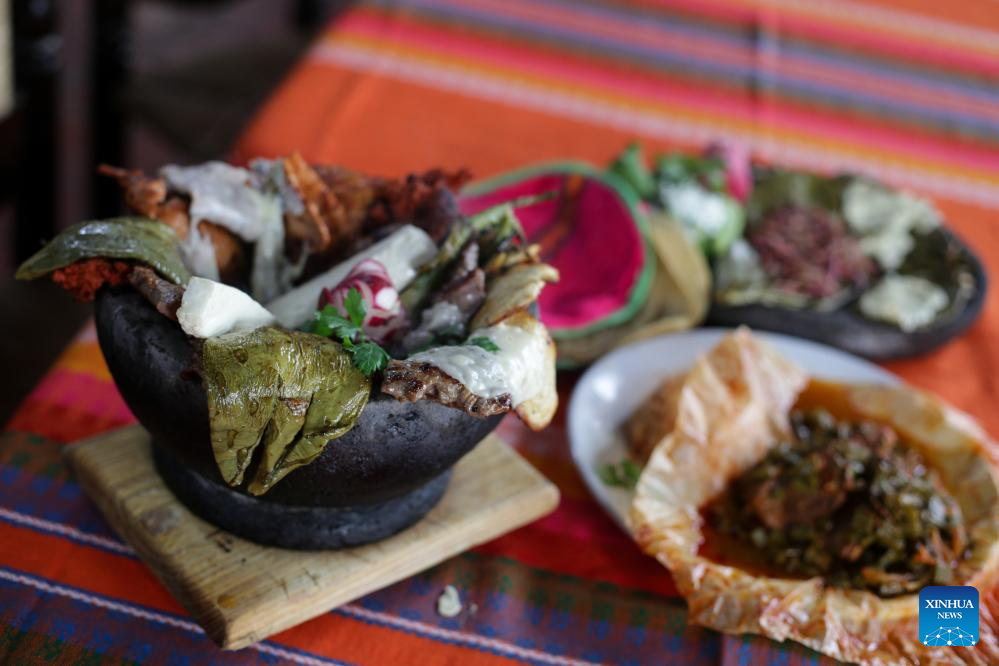
This photo taken on Aug. 3, 2023 shows local cuisine made of prickly pears in Teotihuacan, Mexico.
Cili (Rosa roxburghii), meaning "thorn pear" in Chinese, is a yellowish, spiny fruit renowned for its rich vitamin C content and various nutritional benefits. This distinctive fruit is a hallmark produce of the mountainous regions in southwest China's Guizhou. Currently, the Cili production stands as a key driver in promoting rural revitalization in Longli County, Guizhou Province. The county's Cili cultivation area has expanded to 105,000 mu (7,000 hectares), yielding an annual output of 16,000 tons of fresh fruit. The comprehensive output value exceeds 400 million yuan (approximately 54.87 million U.S. dollars), significantly contributing to the income growth of the over 8,000 local farmers.
Meanwhile in the semi-arid parts of Mexico, another kind of throny fruit also brings profits to local farmers. The prickly pear cactus is a plant that bears fruit featuring thorns all over and a juicy texture with refreshing taste. Thriving in the arid highlands of Mexico, this cactus requires minimal water and pesticides for cultivation. The planting of these fruits not only contributes to local ecological management but also serves as a source of increased income for the community. (Photo by Francisco Canedo/Xinhua)
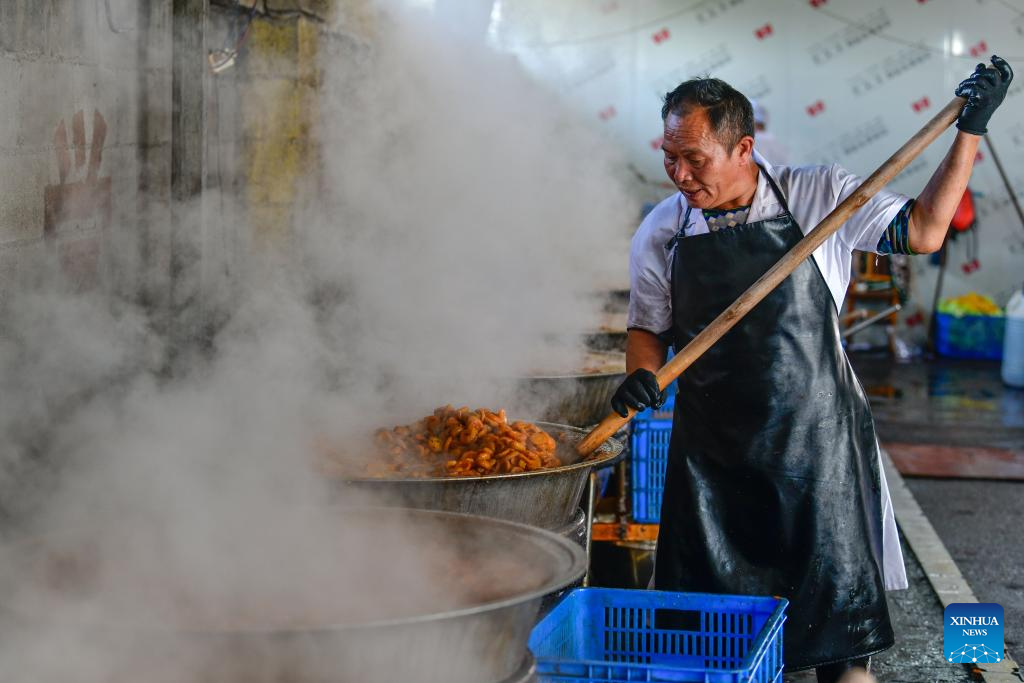
A worker makes preserved Cili fruit in Gujiao Town of Longli County, southwest China's Guizhou Province, Sept. 1, 2023.
Cili (Rosa roxburghii), meaning "thorn pear" in Chinese, is a yellowish, spiny fruit renowned for its rich vitamin C content and various nutritional benefits. This distinctive fruit is a hallmark produce of the mountainous regions in southwest China's Guizhou. Currently, the Cili production stands as a key driver in promoting rural revitalization in Longli County, Guizhou Province. The county's Cili cultivation area has expanded to 105,000 mu (7,000 hectares), yielding an annual output of 16,000 tons of fresh fruit. The comprehensive output value exceeds 400 million yuan (approximately 54.87 million U.S. dollars), significantly contributing to the income growth of the over 8,000 local farmers.
Meanwhile in the semi-arid parts of Mexico, another kind of throny fruit also brings profits to local farmers. The prickly pear cactus is a plant that bears fruit featuring thorns all over and a juicy texture with refreshing taste. Thriving in the arid highlands of Mexico, this cactus requires minimal water and pesticides for cultivation. The planting of these fruits not only contributes to local ecological management but also serves as a source of increased income for the community. (Xinhua/Yang Wenbin)
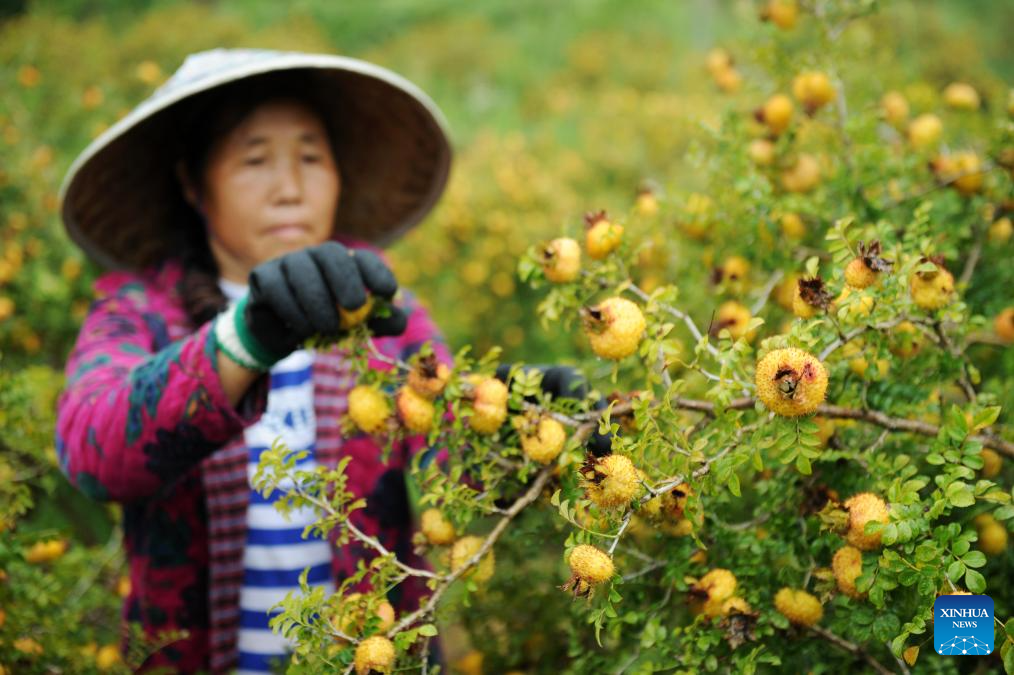
A farmer collects Cili fruits in Gujiao Town of Longli County, southwest China's Guizhou Province, Aug. 22, 2018.
Cili (Rosa roxburghii), meaning "thorn pear" in Chinese, is a yellowish, spiny fruit renowned for its rich vitamin C content and various nutritional benefits. This distinctive fruit is a hallmark produce of the mountainous regions in southwest China's Guizhou. Currently, the Cili production stands as a key driver in promoting rural revitalization in Longli County, Guizhou Province. The county's Cili cultivation area has expanded to 105,000 mu (7,000 hectares), yielding an annual output of 16,000 tons of fresh fruit. The comprehensive output value exceeds 400 million yuan (approximately 54.87 million U.S. dollars), significantly contributing to the income growth of the over 8,000 local farmers.
Meanwhile in the semi-arid parts of Mexico, another kind of throny fruit also brings profits to local farmers. The prickly pear cactus is a plant that bears fruit featuring thorns all over and a juicy texture with refreshing taste. Thriving in the arid highlands of Mexico, this cactus requires minimal water and pesticides for cultivation. The planting of these fruits not only contributes to local ecological management but also serves as a source of increased income for the community. (Xinhua/Yang Wenbin)
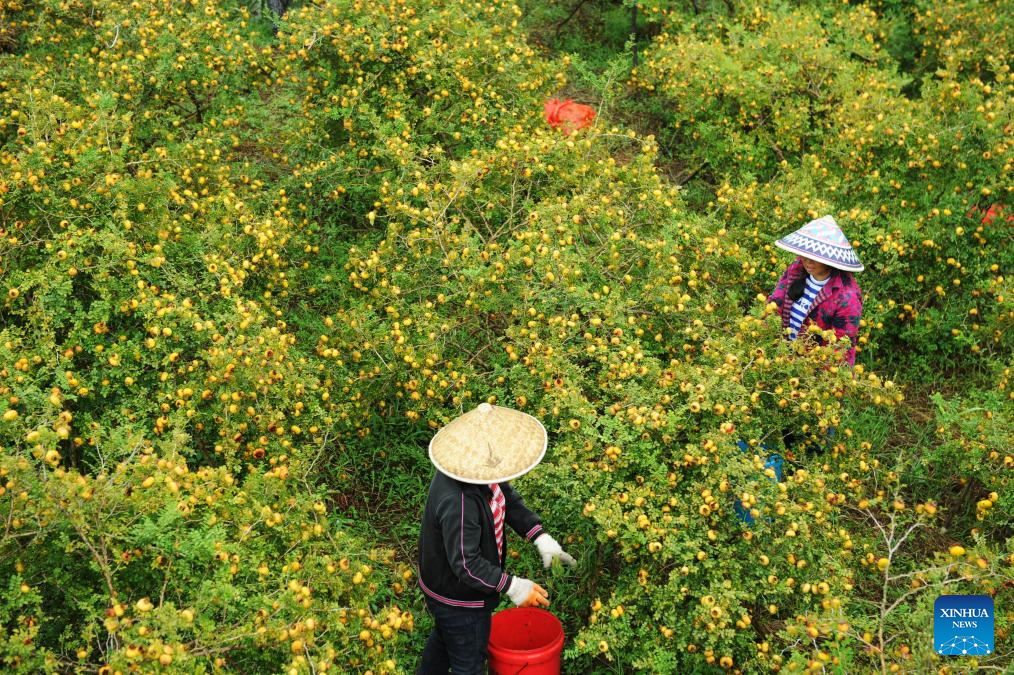
Farmers collect Cili fruits in Gujiao Town of Longli County, southwest China's Guizhou Province, Aug. 22, 2018.
Cili (Rosa roxburghii), meaning "thorn pear" in Chinese, is a yellowish, spiny fruit renowned for its rich vitamin C content and various nutritional benefits. This distinctive fruit is a hallmark produce of the mountainous regions in southwest China's Guizhou. Currently, the Cili production stands as a key driver in promoting rural revitalization in Longli County, Guizhou Province. The county's Cili cultivation area has expanded to 105,000 mu (7,000 hectares), yielding an annual output of 16,000 tons of fresh fruit. The comprehensive output value exceeds 400 million yuan (approximately 54.87 million U.S. dollars), significantly contributing to the income growth of the over 8,000 local farmers.
Meanwhile in the semi-arid parts of Mexico, another kind of throny fruit also brings profits to local farmers. The prickly pear cactus is a plant that bears fruit featuring thorns all over and a juicy texture with refreshing taste. Thriving in the arid highlands of Mexico, this cactus requires minimal water and pesticides for cultivation. The planting of these fruits not only contributes to local ecological management but also serves as a source of increased income for the community. (Xinhua/Yang Wenbin)
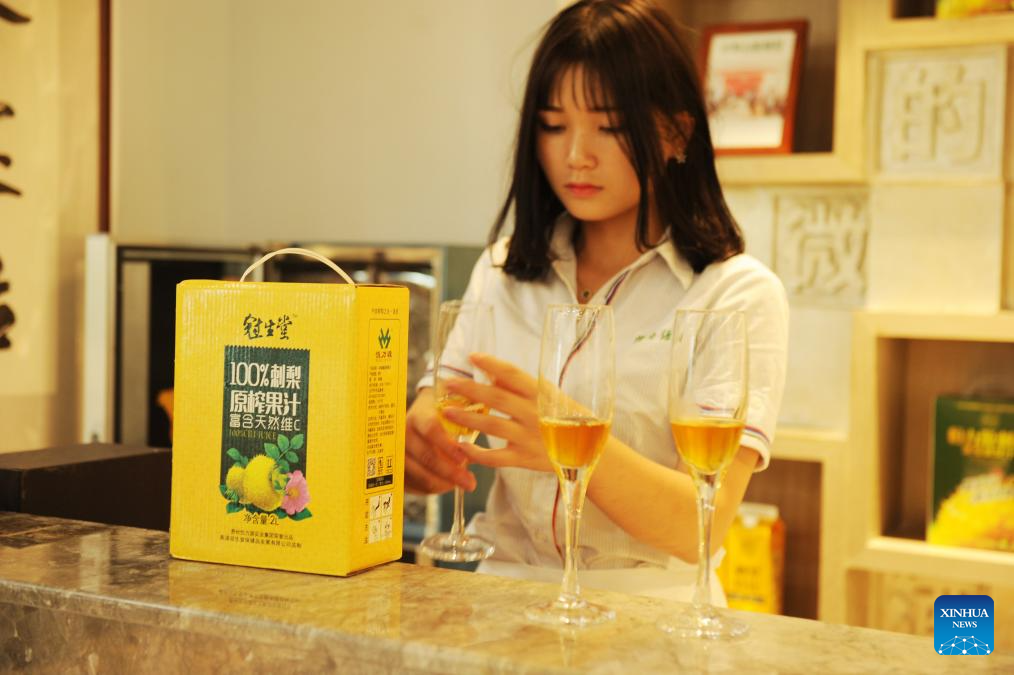
A worker shows a Cili beverage at a Cili processing company in Longli County, southwest China's Guizhou Province, Aug. 23, 2018.
Cili (Rosa roxburghii), meaning "thorn pear" in Chinese, is a yellowish, spiny fruit renowned for its rich vitamin C content and various nutritional benefits. This distinctive fruit is a hallmark produce of the mountainous regions in southwest China's Guizhou. Currently, the Cili production stands as a key driver in promoting rural revitalization in Longli County, Guizhou Province. The county's Cili cultivation area has expanded to 105,000 mu (7,000 hectares), yielding an annual output of 16,000 tons of fresh fruit. The comprehensive output value exceeds 400 million yuan (approximately 54.87 million U.S. dollars), significantly contributing to the income growth of the over 8,000 local farmers.
Meanwhile in the semi-arid parts of Mexico, another kind of throny fruit also brings profits to local farmers. The prickly pear cactus is a plant that bears fruit featuring thorns all over and a juicy texture with refreshing taste. Thriving in the arid highlands of Mexico, this cactus requires minimal water and pesticides for cultivation. The planting of these fruits not only contributes to local ecological management but also serves as a source of increased income for the community. (Xinhua/Yang Wenbin)
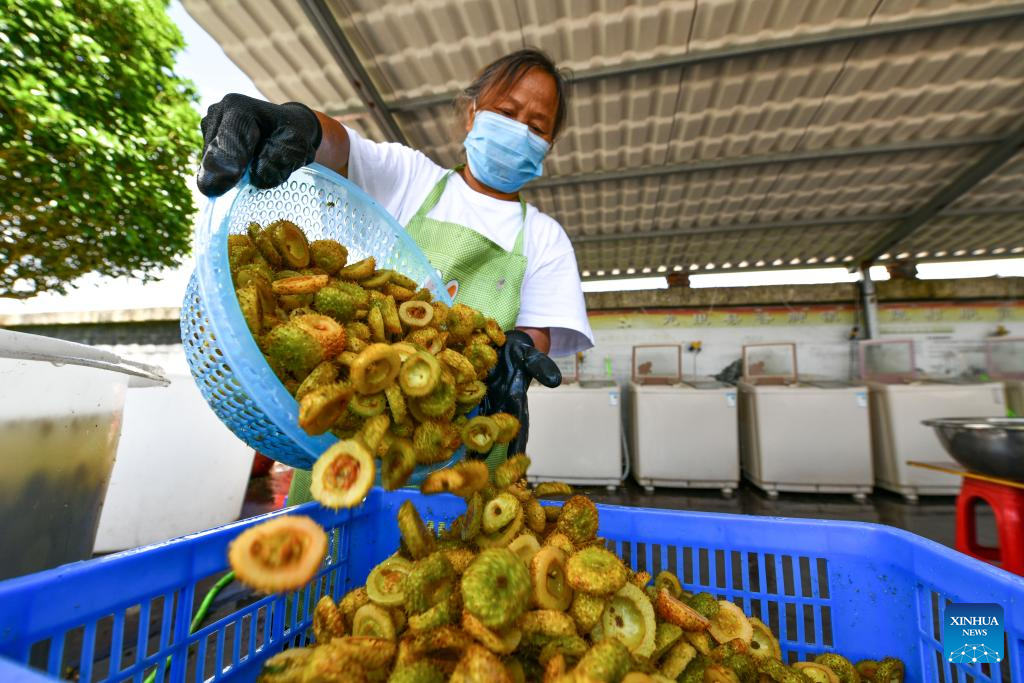
A worker washes Cili fruit slices in Gujiao Town of Longli County, southwest China's Guizhou Province, Aug. 18, 2021.
Cili (Rosa roxburghii), meaning "thorn pear" in Chinese, is a yellowish, spiny fruit renowned for its rich vitamin C content and various nutritional benefits. This distinctive fruit is a hallmark produce of the mountainous regions in southwest China's Guizhou. Currently, the Cili production stands as a key driver in promoting rural revitalization in Longli County, Guizhou Province. The county's Cili cultivation area has expanded to 105,000 mu (7,000 hectares), yielding an annual output of 16,000 tons of fresh fruit. The comprehensive output value exceeds 400 million yuan (approximately 54.87 million U.S. dollars), significantly contributing to the income growth of the over 8,000 local farmers.
Meanwhile in the semi-arid parts of Mexico, another kind of throny fruit also brings profits to local farmers. The prickly pear cactus is a plant that bears fruit featuring thorns all over and a juicy texture with refreshing taste. Thriving in the arid highlands of Mexico, this cactus requires minimal water and pesticides for cultivation. The planting of these fruits not only contributes to local ecological management but also serves as a source of increased income for the community. (Xinhua/Yang Wenbin)
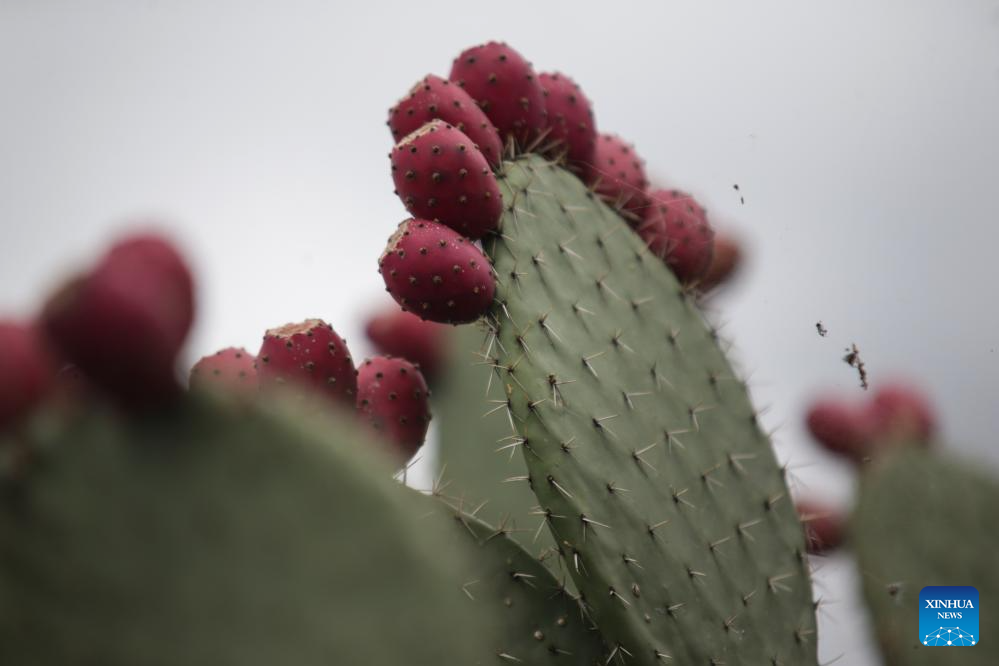
Prickly pear cacti are pictured in Teotihuacan, Mexico, Aug. 3, 2023.
Cili (Rosa roxburghii), meaning "thorn pear" in Chinese, is a yellowish, spiny fruit renowned for its rich vitamin C content and various nutritional benefits. This distinctive fruit is a hallmark produce of the mountainous regions in southwest China's Guizhou. Currently, the Cili production stands as a key driver in promoting rural revitalization in Longli County, Guizhou Province. The county's Cili cultivation area has expanded to 105,000 mu (7,000 hectares), yielding an annual output of 16,000 tons of fresh fruit. The comprehensive output value exceeds 400 million yuan (approximately 54.87 million U.S. dollars), significantly contributing to the income growth of the over 8,000 local farmers.
Meanwhile in the semi-arid parts of Mexico, another kind of throny fruit also brings profits to local farmers. The prickly pear cactus is a plant that bears fruit featuring thorns all over and a juicy texture with refreshing taste. Thriving in the arid highlands of Mexico, this cactus requires minimal water and pesticides for cultivation. The planting of these fruits not only contributes to local ecological management but also serves as a source of increased income for the community. (Photo by Francisco Canedo/Xinhua)
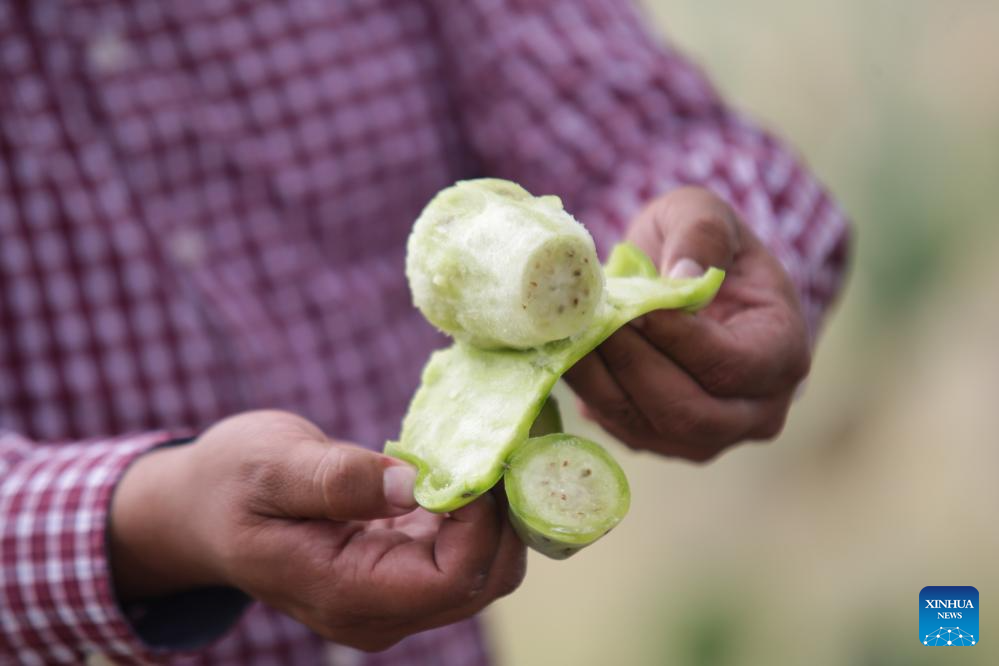
A farmer peels a prickly pear in Teotihuacan, Mexico, Aug. 3, 2023.
Cili (Rosa roxburghii), meaning "thorn pear" in Chinese, is a yellowish, spiny fruit renowned for its rich vitamin C content and various nutritional benefits. This distinctive fruit is a hallmark produce of the mountainous regions in southwest China's Guizhou. Currently, the Cili production stands as a key driver in promoting rural revitalization in Longli County, Guizhou Province. The county's Cili cultivation area has expanded to 105,000 mu (7,000 hectares), yielding an annual output of 16,000 tons of fresh fruit. The comprehensive output value exceeds 400 million yuan (approximately 54.87 million U.S. dollars), significantly contributing to the income growth of the over 8,000 local farmers.
Meanwhile in the semi-arid parts of Mexico, another kind of throny fruit also brings profits to local farmers. The prickly pear cactus is a plant that bears fruit featuring thorns all over and a juicy texture with refreshing taste. Thriving in the arid highlands of Mexico, this cactus requires minimal water and pesticides for cultivation. The planting of these fruits not only contributes to local ecological management but also serves as a source of increased income for the community. (Photo by Francisco Canedo/Xinhua)
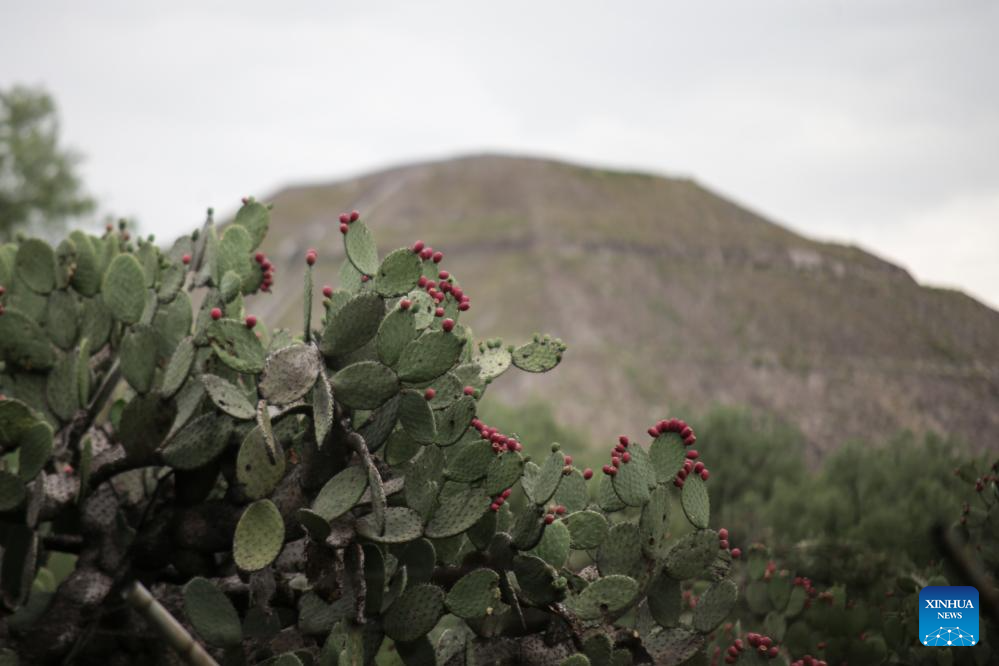
Prickly pears are pictured in Teotihuacan, Mexico, Aug. 3, 2023.
Cili (Rosa roxburghii), meaning "thorn pear" in Chinese, is a yellowish, spiny fruit renowned for its rich vitamin C content and various nutritional benefits. This distinctive fruit is a hallmark produce of the mountainous regions in southwest China's Guizhou. Currently, the Cili production stands as a key driver in promoting rural revitalization in Longli County, Guizhou Province. The county's Cili cultivation area has expanded to 105,000 mu (7,000 hectares), yielding an annual output of 16,000 tons of fresh fruit. The comprehensive output value exceeds 400 million yuan (approximately 54.87 million U.S. dollars), significantly contributing to the income growth of the over 8,000 local farmers.
Meanwhile in the semi-arid parts of Mexico, another kind of throny fruit also brings profits to local farmers. The prickly pear cactus is a plant that bears fruit featuring thorns all over and a juicy texture with refreshing taste. Thriving in the arid highlands of Mexico, this cactus requires minimal water and pesticides for cultivation. The planting of these fruits not only contributes to local ecological management but also serves as a source of increased income for the community. (Photo by Francisco Canedo/Xinhua)
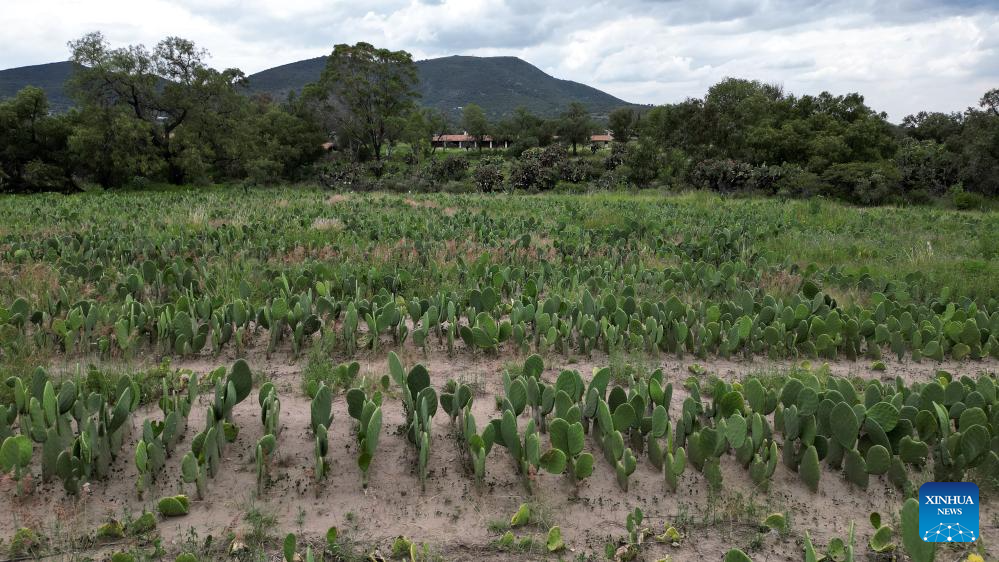
This aerial photo taken on Aug. 3, 2023 shows a plantation of prickly pears in Teotihuacan, Mexico.
Cili (Rosa roxburghii), meaning "thorn pear" in Chinese, is a yellowish, spiny fruit renowned for its rich vitamin C content and various nutritional benefits. This distinctive fruit is a hallmark produce of the mountainous regions in southwest China's Guizhou. Currently, the Cili production stands as a key driver in promoting rural revitalization in Longli County, Guizhou Province. The county's Cili cultivation area has expanded to 105,000 mu (7,000 hectares), yielding an annual output of 16,000 tons of fresh fruit. The comprehensive output value exceeds 400 million yuan (approximately 54.87 million U.S. dollars), significantly contributing to the income growth of the over 8,000 local farmers.
Meanwhile in the semi-arid parts of Mexico, another kind of throny fruit also brings profits to local farmers. The prickly pear cactus is a plant that bears fruit featuring thorns all over and a juicy texture with refreshing taste. Thriving in the arid highlands of Mexico, this cactus requires minimal water and pesticides for cultivation. The planting of these fruits not only contributes to local ecological management but also serves as a source of increased income for the community. (Photo by Francisco Canedo/Xinhua)
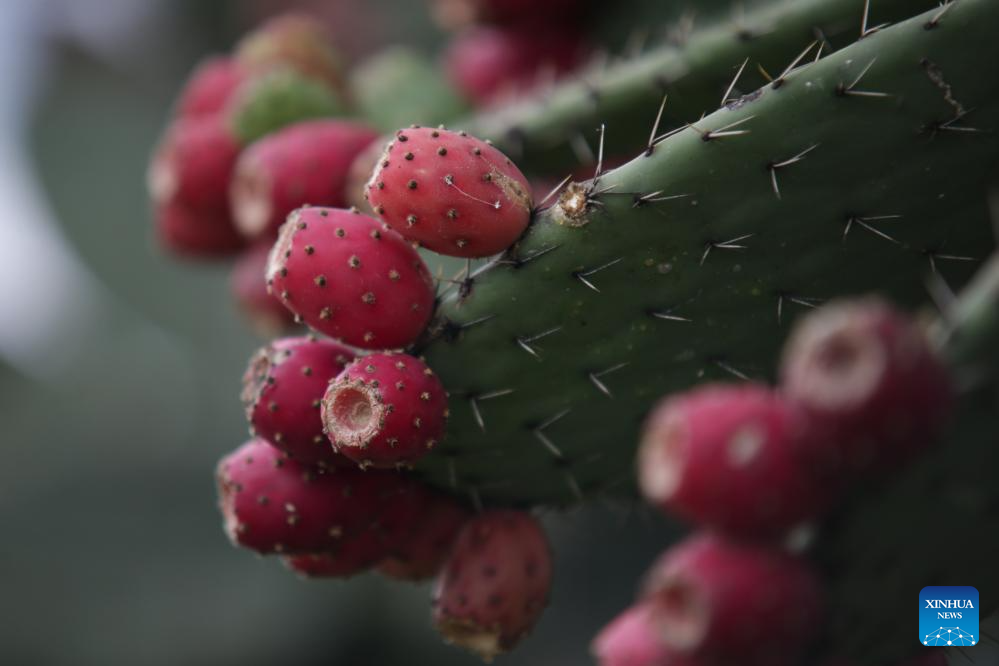
Prickly pear cacti are pictured in Teotihuacan, Mexico, Aug. 3, 2023.
Cili (Rosa roxburghii), meaning "thorn pear" in Chinese, is a yellowish, spiny fruit renowned for its rich vitamin C content and various nutritional benefits. This distinctive fruit is a hallmark produce of the mountainous regions in southwest China's Guizhou. Currently, the Cili production stands as a key driver in promoting rural revitalization in Longli County, Guizhou Province. The county's Cili cultivation area has expanded to 105,000 mu (7,000 hectares), yielding an annual output of 16,000 tons of fresh fruit. The comprehensive output value exceeds 400 million yuan (approximately 54.87 million U.S. dollars), significantly contributing to the income growth of the over 8,000 local farmers.
Meanwhile in the semi-arid parts of Mexico, another kind of throny fruit also brings profits to local farmers. The prickly pear cactus is a plant that bears fruit featuring thorns all over and a juicy texture with refreshing taste. Thriving in the arid highlands of Mexico, this cactus requires minimal water and pesticides for cultivation. The planting of these fruits not only contributes to local ecological management but also serves as a source of increased income for the community. (Photo by Francisco Canedo/Xinhua)
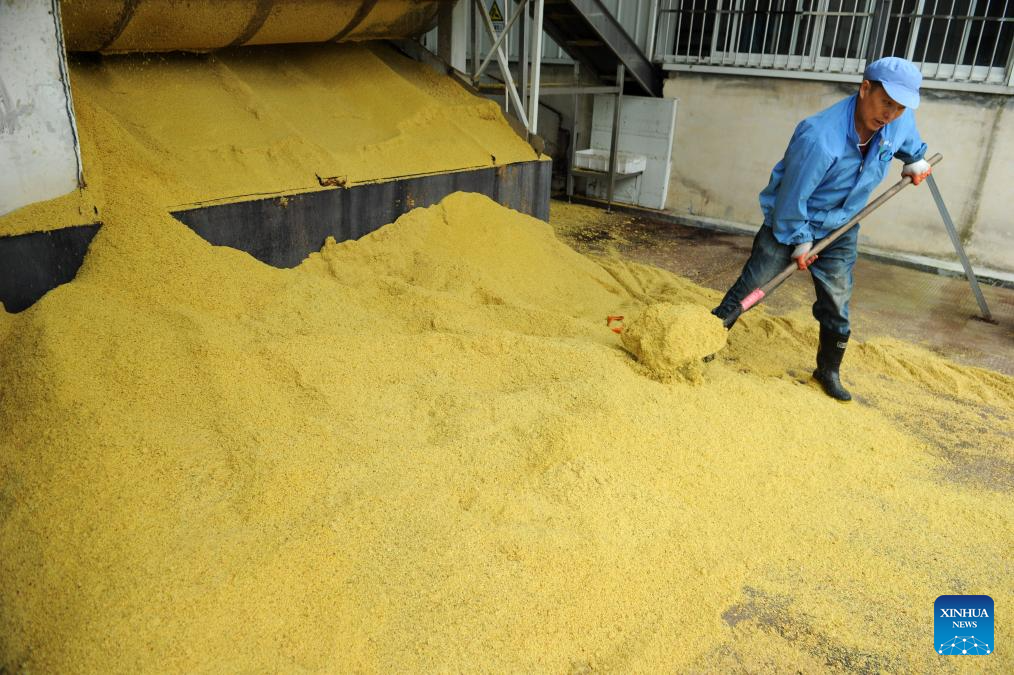
A worker recycles Cili fruit residue at a factory in Longli County, southwest China's Guizhou Province, Aug. 23, 2018.
Cili (Rosa roxburghii), meaning "thorn pear" in Chinese, is a yellowish, spiny fruit renowned for its rich vitamin C content and various nutritional benefits. This distinctive fruit is a hallmark produce of the mountainous regions in southwest China's Guizhou. Currently, the Cili production stands as a key driver in promoting rural revitalization in Longli County, Guizhou Province. The county's Cili cultivation area has expanded to 105,000 mu (7,000 hectares), yielding an annual output of 16,000 tons of fresh fruit. The comprehensive output value exceeds 400 million yuan (approximately 54.87 million U.S. dollars), significantly contributing to the income growth of the over 8,000 local farmers.
Meanwhile in the semi-arid parts of Mexico, another kind of throny fruit also brings profits to local farmers. The prickly pear cactus is a plant that bears fruit featuring thorns all over and a juicy texture with refreshing taste. Thriving in the arid highlands of Mexico, this cactus requires minimal water and pesticides for cultivation. The planting of these fruits not only contributes to local ecological management but also serves as a source of increased income for the community. (Xinhua/Yang Wenbin)



